The information system management
VerifiedAdded on 2022/08/24
|8
|1676
|18
AI Summary
Contribute Materials
Your contribution can guide someone’s learning journey. Share your
documents today.
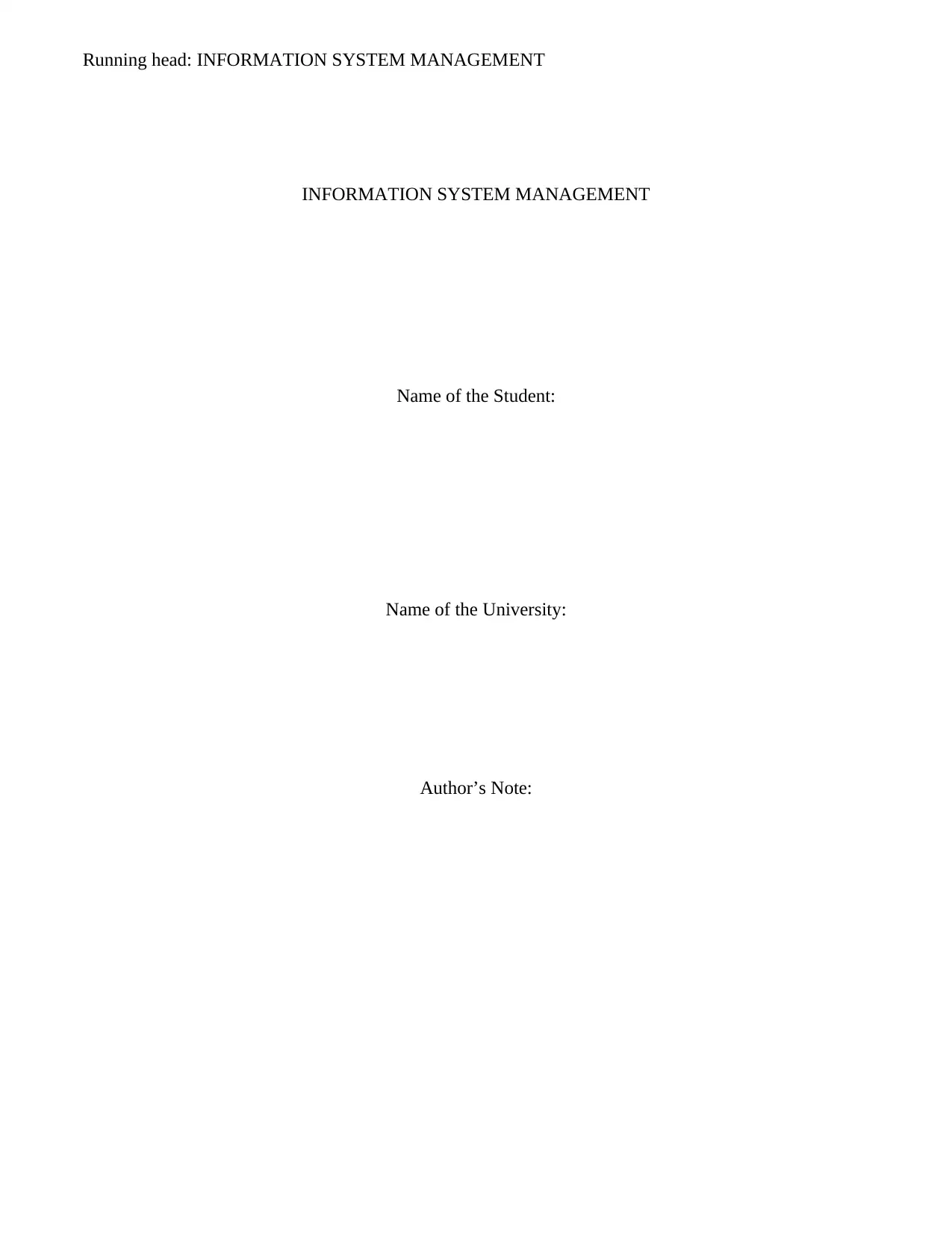
Running head: INFORMATION SYSTEM MANAGEMENT
INFORMATION SYSTEM MANAGEMENT
Name of the Student:
Name of the University:
Author’s Note:
INFORMATION SYSTEM MANAGEMENT
Name of the Student:
Name of the University:
Author’s Note:
Secure Best Marks with AI Grader
Need help grading? Try our AI Grader for instant feedback on your assignments.
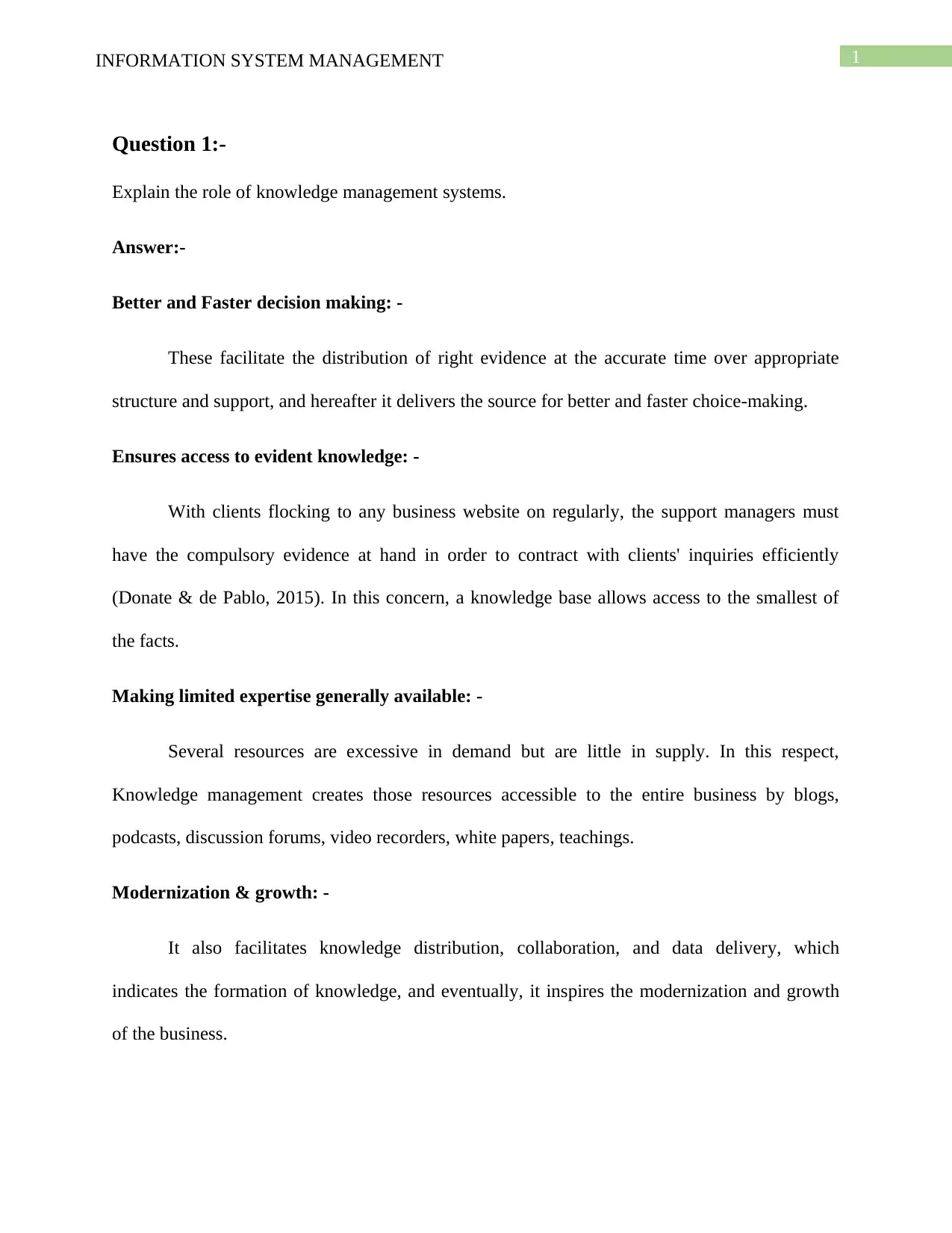
1INFORMATION SYSTEM MANAGEMENT
Question 1:-
Explain the role of knowledge management systems.
Answer:-
Better and Faster decision making: -
These facilitate the distribution of right evidence at the accurate time over appropriate
structure and support, and hereafter it delivers the source for better and faster choice-making.
Ensures access to evident knowledge: -
With clients flocking to any business website on regularly, the support managers must
have the compulsory evidence at hand in order to contract with clients' inquiries efficiently
(Donate & de Pablo, 2015). In this concern, a knowledge base allows access to the smallest of
the facts.
Making limited expertise generally available: -
Several resources are excessive in demand but are little in supply. In this respect,
Knowledge management creates those resources accessible to the entire business by blogs,
podcasts, discussion forums, video recorders, white papers, teachings.
Modernization & growth: -
It also facilitates knowledge distribution, collaboration, and data delivery, which
indicates the formation of knowledge, and eventually, it inspires the modernization and growth
of the business.
Question 1:-
Explain the role of knowledge management systems.
Answer:-
Better and Faster decision making: -
These facilitate the distribution of right evidence at the accurate time over appropriate
structure and support, and hereafter it delivers the source for better and faster choice-making.
Ensures access to evident knowledge: -
With clients flocking to any business website on regularly, the support managers must
have the compulsory evidence at hand in order to contract with clients' inquiries efficiently
(Donate & de Pablo, 2015). In this concern, a knowledge base allows access to the smallest of
the facts.
Making limited expertise generally available: -
Several resources are excessive in demand but are little in supply. In this respect,
Knowledge management creates those resources accessible to the entire business by blogs,
podcasts, discussion forums, video recorders, white papers, teachings.
Modernization & growth: -
It also facilitates knowledge distribution, collaboration, and data delivery, which
indicates the formation of knowledge, and eventually, it inspires the modernization and growth
of the business.
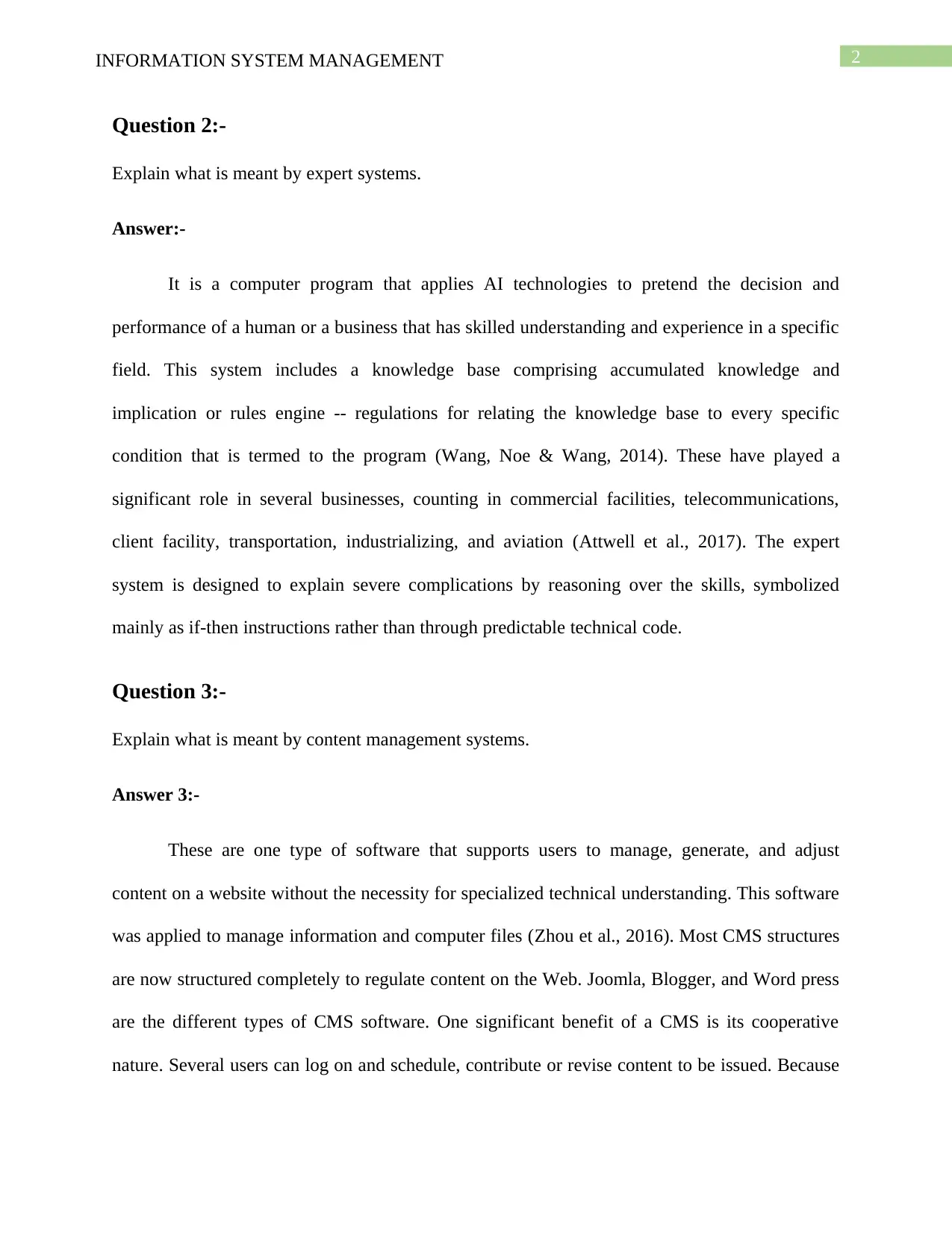
2INFORMATION SYSTEM MANAGEMENT
Question 2:-
Explain what is meant by expert systems.
Answer:-
It is a computer program that applies AI technologies to pretend the decision and
performance of a human or a business that has skilled understanding and experience in a specific
field. This system includes a knowledge base comprising accumulated knowledge and
implication or rules engine -- regulations for relating the knowledge base to every specific
condition that is termed to the program (Wang, Noe & Wang, 2014). These have played a
significant role in several businesses, counting in commercial facilities, telecommunications,
client facility, transportation, industrializing, and aviation (Attwell et al., 2017). The expert
system is designed to explain severe complications by reasoning over the skills, symbolized
mainly as if-then instructions rather than through predictable technical code.
Question 3:-
Explain what is meant by content management systems.
Answer 3:-
These are one type of software that supports users to manage, generate, and adjust
content on a website without the necessity for specialized technical understanding. This software
was applied to manage information and computer files (Zhou et al., 2016). Most CMS structures
are now structured completely to regulate content on the Web. Joomla, Blogger, and Word press
are the different types of CMS software. One significant benefit of a CMS is its cooperative
nature. Several users can log on and schedule, contribute or revise content to be issued. Because
Question 2:-
Explain what is meant by expert systems.
Answer:-
It is a computer program that applies AI technologies to pretend the decision and
performance of a human or a business that has skilled understanding and experience in a specific
field. This system includes a knowledge base comprising accumulated knowledge and
implication or rules engine -- regulations for relating the knowledge base to every specific
condition that is termed to the program (Wang, Noe & Wang, 2014). These have played a
significant role in several businesses, counting in commercial facilities, telecommunications,
client facility, transportation, industrializing, and aviation (Attwell et al., 2017). The expert
system is designed to explain severe complications by reasoning over the skills, symbolized
mainly as if-then instructions rather than through predictable technical code.
Question 3:-
Explain what is meant by content management systems.
Answer 3:-
These are one type of software that supports users to manage, generate, and adjust
content on a website without the necessity for specialized technical understanding. This software
was applied to manage information and computer files (Zhou et al., 2016). Most CMS structures
are now structured completely to regulate content on the Web. Joomla, Blogger, and Word press
are the different types of CMS software. One significant benefit of a CMS is its cooperative
nature. Several users can log on and schedule, contribute or revise content to be issued. Because
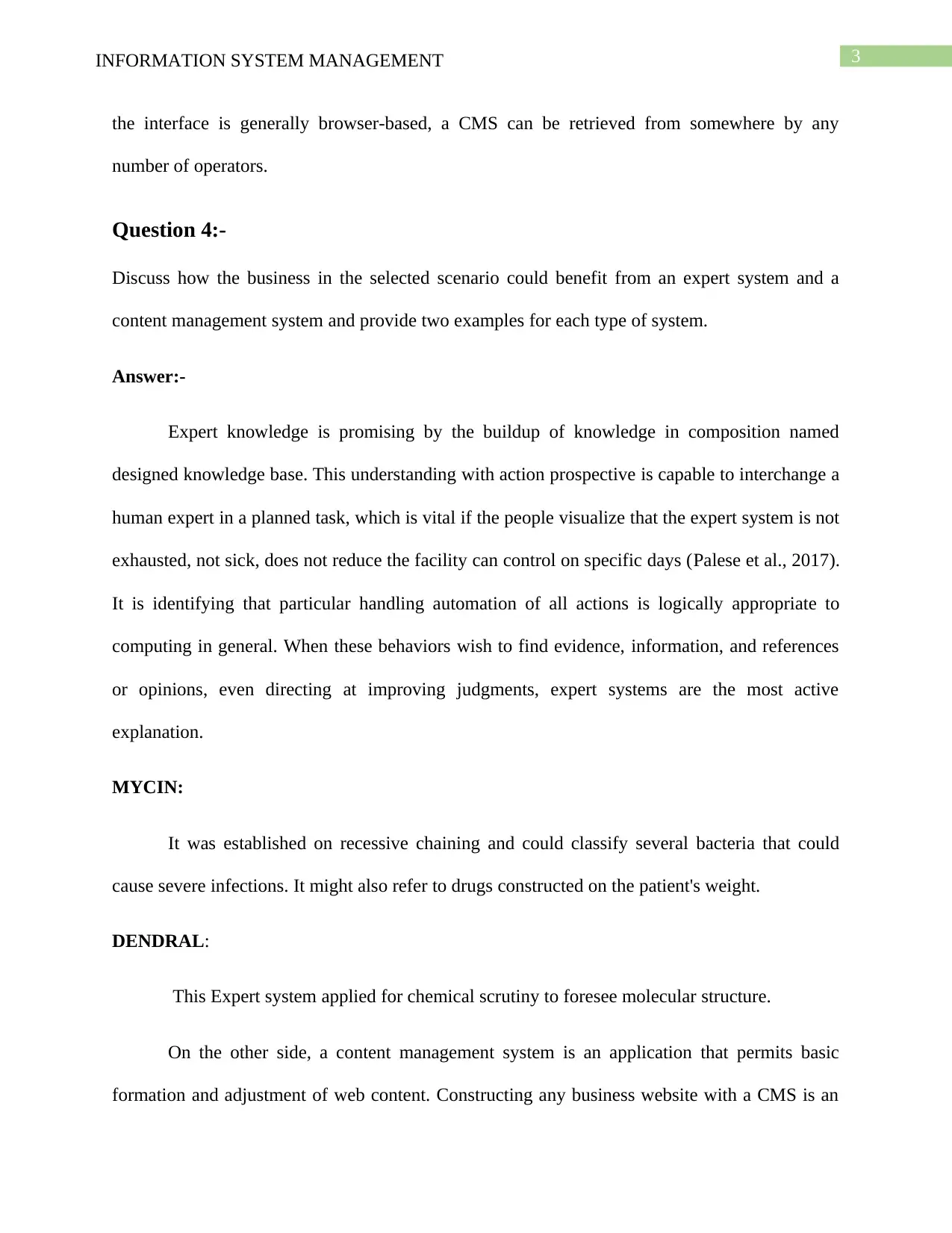
3INFORMATION SYSTEM MANAGEMENT
the interface is generally browser-based, a CMS can be retrieved from somewhere by any
number of operators.
Question 4:-
Discuss how the business in the selected scenario could benefit from an expert system and a
content management system and provide two examples for each type of system.
Answer:-
Expert knowledge is promising by the buildup of knowledge in composition named
designed knowledge base. This understanding with action prospective is capable to interchange a
human expert in a planned task, which is vital if the people visualize that the expert system is not
exhausted, not sick, does not reduce the facility can control on specific days (Palese et al., 2017).
It is identifying that particular handling automation of all actions is logically appropriate to
computing in general. When these behaviors wish to find evidence, information, and references
or opinions, even directing at improving judgments, expert systems are the most active
explanation.
MYCIN:
It was established on recessive chaining and could classify several bacteria that could
cause severe infections. It might also refer to drugs constructed on the patient's weight.
DENDRAL:
This Expert system applied for chemical scrutiny to foresee molecular structure.
On the other side, a content management system is an application that permits basic
formation and adjustment of web content. Constructing any business website with a CMS is an
the interface is generally browser-based, a CMS can be retrieved from somewhere by any
number of operators.
Question 4:-
Discuss how the business in the selected scenario could benefit from an expert system and a
content management system and provide two examples for each type of system.
Answer:-
Expert knowledge is promising by the buildup of knowledge in composition named
designed knowledge base. This understanding with action prospective is capable to interchange a
human expert in a planned task, which is vital if the people visualize that the expert system is not
exhausted, not sick, does not reduce the facility can control on specific days (Palese et al., 2017).
It is identifying that particular handling automation of all actions is logically appropriate to
computing in general. When these behaviors wish to find evidence, information, and references
or opinions, even directing at improving judgments, expert systems are the most active
explanation.
MYCIN:
It was established on recessive chaining and could classify several bacteria that could
cause severe infections. It might also refer to drugs constructed on the patient's weight.
DENDRAL:
This Expert system applied for chemical scrutiny to foresee molecular structure.
On the other side, a content management system is an application that permits basic
formation and adjustment of web content. Constructing any business website with a CMS is an
Secure Best Marks with AI Grader
Need help grading? Try our AI Grader for instant feedback on your assignments.
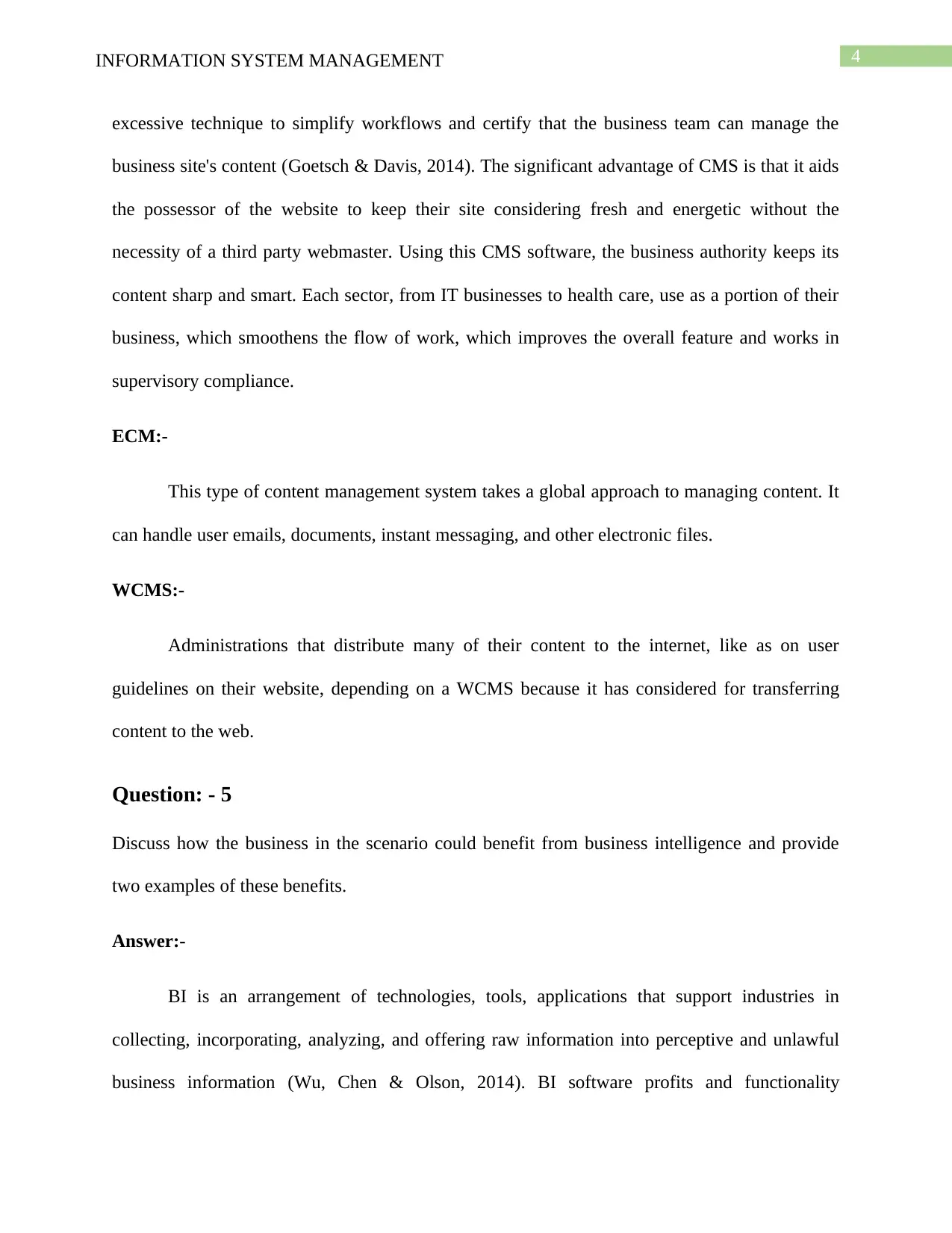
4INFORMATION SYSTEM MANAGEMENT
excessive technique to simplify workflows and certify that the business team can manage the
business site's content (Goetsch & Davis, 2014). The significant advantage of CMS is that it aids
the possessor of the website to keep their site considering fresh and energetic without the
necessity of a third party webmaster. Using this CMS software, the business authority keeps its
content sharp and smart. Each sector, from IT businesses to health care, use as a portion of their
business, which smoothens the flow of work, which improves the overall feature and works in
supervisory compliance.
ECM:-
This type of content management system takes a global approach to managing content. It
can handle user emails, documents, instant messaging, and other electronic files.
WCMS:-
Administrations that distribute many of their content to the internet, like as on user
guidelines on their website, depending on a WCMS because it has considered for transferring
content to the web.
Question: - 5
Discuss how the business in the scenario could benefit from business intelligence and provide
two examples of these benefits.
Answer:-
BI is an arrangement of technologies, tools, applications that support industries in
collecting, incorporating, analyzing, and offering raw information into perceptive and unlawful
business information (Wu, Chen & Olson, 2014). BI software profits and functionality
excessive technique to simplify workflows and certify that the business team can manage the
business site's content (Goetsch & Davis, 2014). The significant advantage of CMS is that it aids
the possessor of the website to keep their site considering fresh and energetic without the
necessity of a third party webmaster. Using this CMS software, the business authority keeps its
content sharp and smart. Each sector, from IT businesses to health care, use as a portion of their
business, which smoothens the flow of work, which improves the overall feature and works in
supervisory compliance.
ECM:-
This type of content management system takes a global approach to managing content. It
can handle user emails, documents, instant messaging, and other electronic files.
WCMS:-
Administrations that distribute many of their content to the internet, like as on user
guidelines on their website, depending on a WCMS because it has considered for transferring
content to the web.
Question: - 5
Discuss how the business in the scenario could benefit from business intelligence and provide
two examples of these benefits.
Answer:-
BI is an arrangement of technologies, tools, applications that support industries in
collecting, incorporating, analyzing, and offering raw information into perceptive and unlawful
business information (Wu, Chen & Olson, 2014). BI software profits and functionality
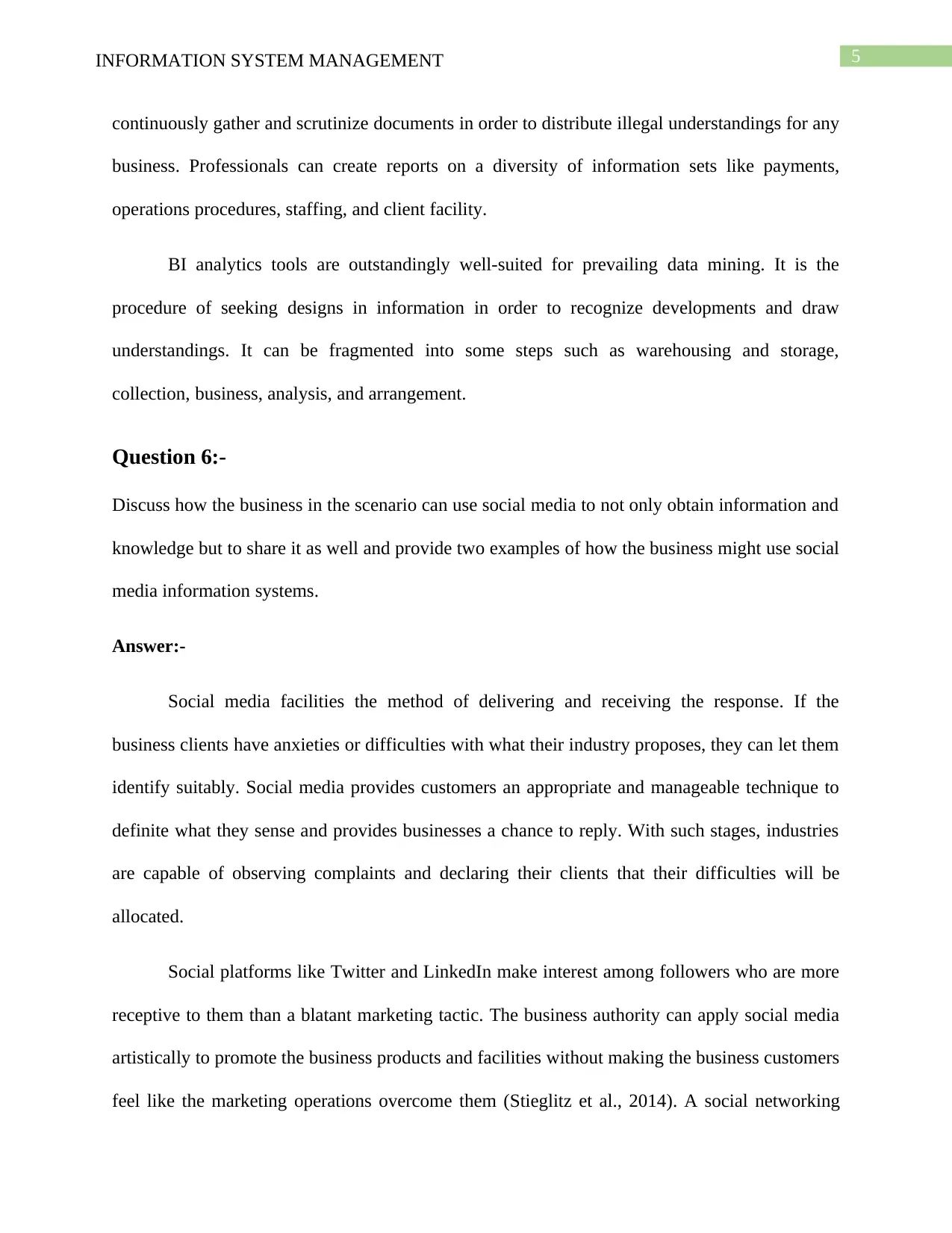
5INFORMATION SYSTEM MANAGEMENT
continuously gather and scrutinize documents in order to distribute illegal understandings for any
business. Professionals can create reports on a diversity of information sets like payments,
operations procedures, staffing, and client facility.
BI analytics tools are outstandingly well-suited for prevailing data mining. It is the
procedure of seeking designs in information in order to recognize developments and draw
understandings. It can be fragmented into some steps such as warehousing and storage,
collection, business, analysis, and arrangement.
Question 6:-
Discuss how the business in the scenario can use social media to not only obtain information and
knowledge but to share it as well and provide two examples of how the business might use social
media information systems.
Answer:-
Social media facilities the method of delivering and receiving the response. If the
business clients have anxieties or difficulties with what their industry proposes, they can let them
identify suitably. Social media provides customers an appropriate and manageable technique to
definite what they sense and provides businesses a chance to reply. With such stages, industries
are capable of observing complaints and declaring their clients that their difficulties will be
allocated.
Social platforms like Twitter and LinkedIn make interest among followers who are more
receptive to them than a blatant marketing tactic. The business authority can apply social media
artistically to promote the business products and facilities without making the business customers
feel like the marketing operations overcome them (Stieglitz et al., 2014). A social networking
continuously gather and scrutinize documents in order to distribute illegal understandings for any
business. Professionals can create reports on a diversity of information sets like payments,
operations procedures, staffing, and client facility.
BI analytics tools are outstandingly well-suited for prevailing data mining. It is the
procedure of seeking designs in information in order to recognize developments and draw
understandings. It can be fragmented into some steps such as warehousing and storage,
collection, business, analysis, and arrangement.
Question 6:-
Discuss how the business in the scenario can use social media to not only obtain information and
knowledge but to share it as well and provide two examples of how the business might use social
media information systems.
Answer:-
Social media facilities the method of delivering and receiving the response. If the
business clients have anxieties or difficulties with what their industry proposes, they can let them
identify suitably. Social media provides customers an appropriate and manageable technique to
definite what they sense and provides businesses a chance to reply. With such stages, industries
are capable of observing complaints and declaring their clients that their difficulties will be
allocated.
Social platforms like Twitter and LinkedIn make interest among followers who are more
receptive to them than a blatant marketing tactic. The business authority can apply social media
artistically to promote the business products and facilities without making the business customers
feel like the marketing operations overcome them (Stieglitz et al., 2014). A social networking
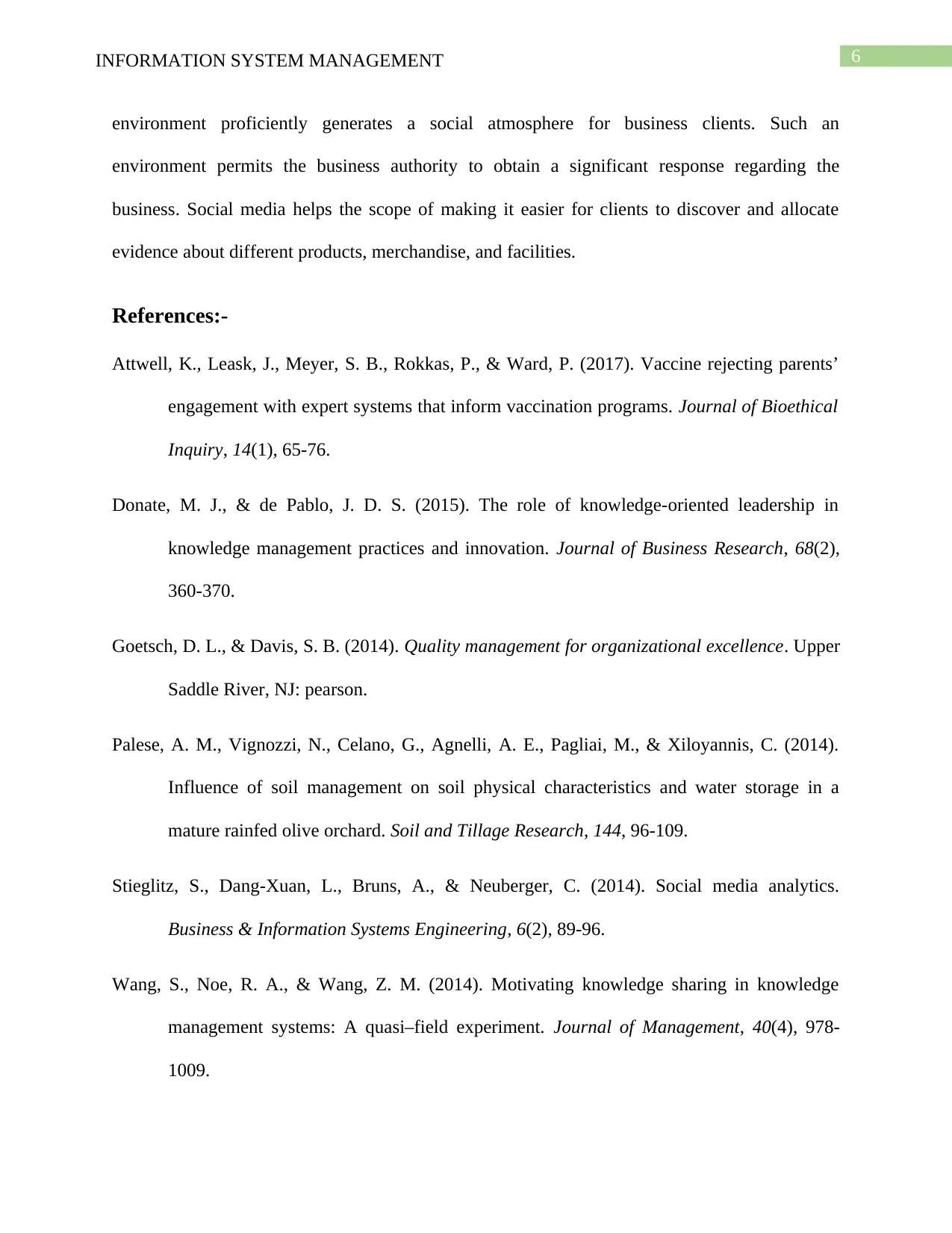
6INFORMATION SYSTEM MANAGEMENT
environment proficiently generates a social atmosphere for business clients. Such an
environment permits the business authority to obtain a significant response regarding the
business. Social media helps the scope of making it easier for clients to discover and allocate
evidence about different products, merchandise, and facilities.
References:-
Attwell, K., Leask, J., Meyer, S. B., Rokkas, P., & Ward, P. (2017). Vaccine rejecting parents’
engagement with expert systems that inform vaccination programs. Journal of Bioethical
Inquiry, 14(1), 65-76.
Donate, M. J., & de Pablo, J. D. S. (2015). The role of knowledge-oriented leadership in
knowledge management practices and innovation. Journal of Business Research, 68(2),
360-370.
Goetsch, D. L., & Davis, S. B. (2014). Quality management for organizational excellence. Upper
Saddle River, NJ: pearson.
Palese, A. M., Vignozzi, N., Celano, G., Agnelli, A. E., Pagliai, M., & Xiloyannis, C. (2014).
Influence of soil management on soil physical characteristics and water storage in a
mature rainfed olive orchard. Soil and Tillage Research, 144, 96-109.
Stieglitz, S., Dang-Xuan, L., Bruns, A., & Neuberger, C. (2014). Social media analytics.
Business & Information Systems Engineering, 6(2), 89-96.
Wang, S., Noe, R. A., & Wang, Z. M. (2014). Motivating knowledge sharing in knowledge
management systems: A quasi–field experiment. Journal of Management, 40(4), 978-
1009.
environment proficiently generates a social atmosphere for business clients. Such an
environment permits the business authority to obtain a significant response regarding the
business. Social media helps the scope of making it easier for clients to discover and allocate
evidence about different products, merchandise, and facilities.
References:-
Attwell, K., Leask, J., Meyer, S. B., Rokkas, P., & Ward, P. (2017). Vaccine rejecting parents’
engagement with expert systems that inform vaccination programs. Journal of Bioethical
Inquiry, 14(1), 65-76.
Donate, M. J., & de Pablo, J. D. S. (2015). The role of knowledge-oriented leadership in
knowledge management practices and innovation. Journal of Business Research, 68(2),
360-370.
Goetsch, D. L., & Davis, S. B. (2014). Quality management for organizational excellence. Upper
Saddle River, NJ: pearson.
Palese, A. M., Vignozzi, N., Celano, G., Agnelli, A. E., Pagliai, M., & Xiloyannis, C. (2014).
Influence of soil management on soil physical characteristics and water storage in a
mature rainfed olive orchard. Soil and Tillage Research, 144, 96-109.
Stieglitz, S., Dang-Xuan, L., Bruns, A., & Neuberger, C. (2014). Social media analytics.
Business & Information Systems Engineering, 6(2), 89-96.
Wang, S., Noe, R. A., & Wang, Z. M. (2014). Motivating knowledge sharing in knowledge
management systems: A quasi–field experiment. Journal of Management, 40(4), 978-
1009.
Paraphrase This Document
Need a fresh take? Get an instant paraphrase of this document with our AI Paraphraser
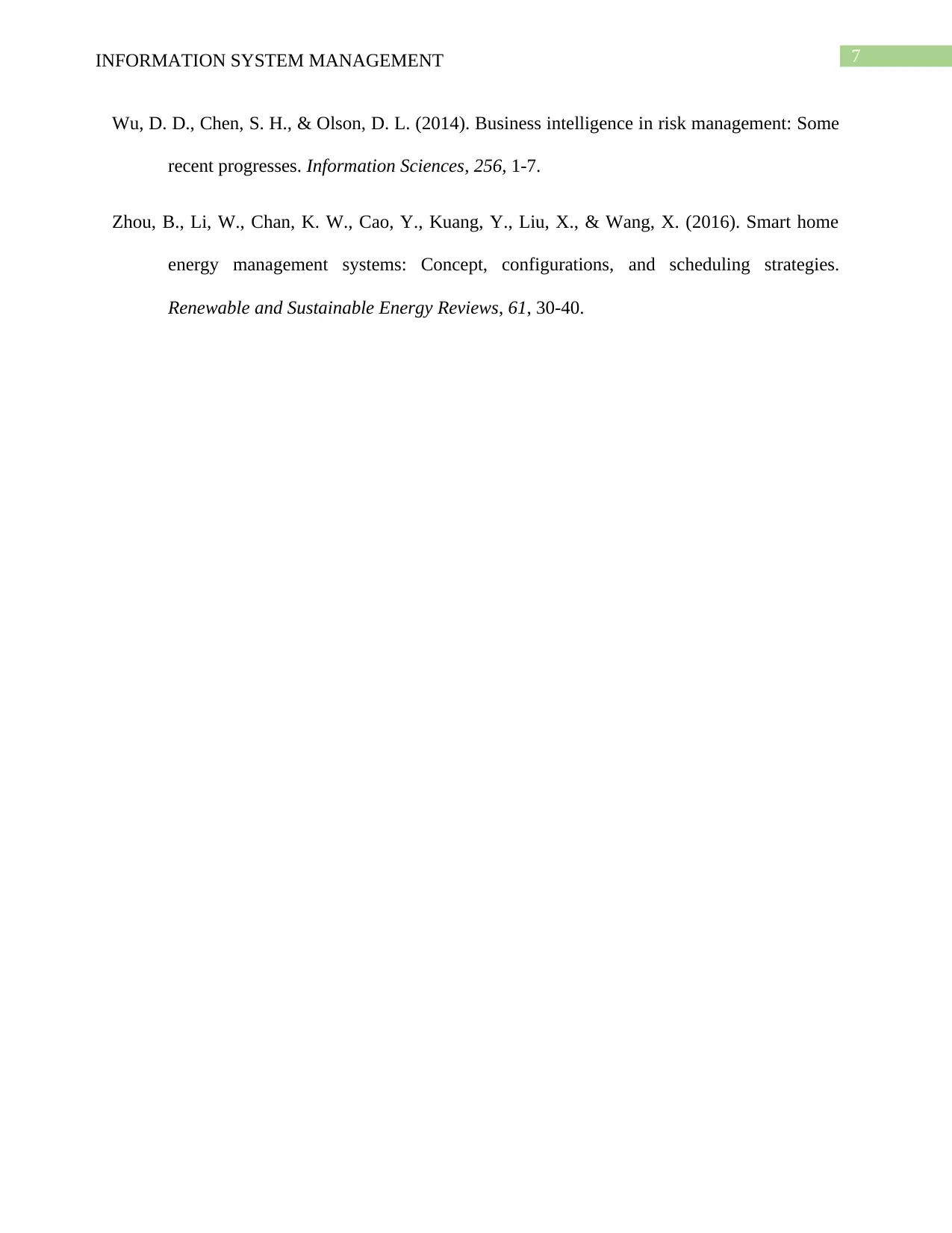
7INFORMATION SYSTEM MANAGEMENT
Wu, D. D., Chen, S. H., & Olson, D. L. (2014). Business intelligence in risk management: Some
recent progresses. Information Sciences, 256, 1-7.
Zhou, B., Li, W., Chan, K. W., Cao, Y., Kuang, Y., Liu, X., & Wang, X. (2016). Smart home
energy management systems: Concept, configurations, and scheduling strategies.
Renewable and Sustainable Energy Reviews, 61, 30-40.
Wu, D. D., Chen, S. H., & Olson, D. L. (2014). Business intelligence in risk management: Some
recent progresses. Information Sciences, 256, 1-7.
Zhou, B., Li, W., Chan, K. W., Cao, Y., Kuang, Y., Liu, X., & Wang, X. (2016). Smart home
energy management systems: Concept, configurations, and scheduling strategies.
Renewable and Sustainable Energy Reviews, 61, 30-40.
1 out of 8
Related Documents
Your All-in-One AI-Powered Toolkit for Academic Success.
+13062052269
info@desklib.com
Available 24*7 on WhatsApp / Email
![[object Object]](/_next/static/media/star-bottom.7253800d.svg)
Unlock your academic potential
© 2024 | Zucol Services PVT LTD | All rights reserved.




